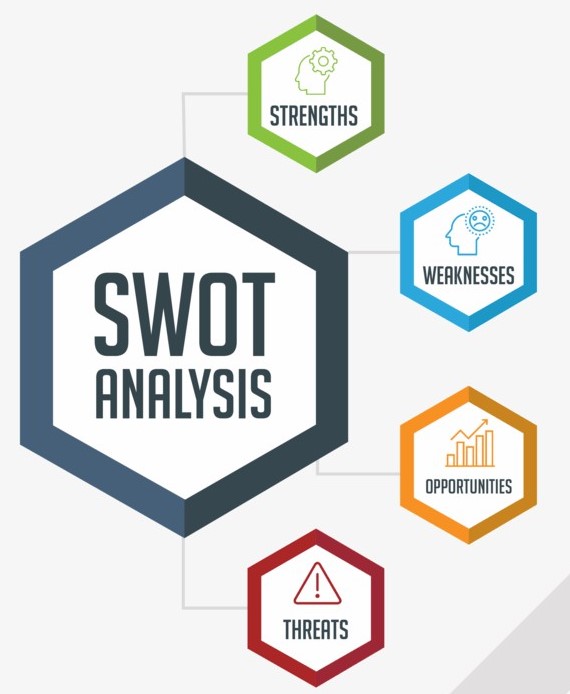Strategy of Digital Marketing
How to Create a
Digital Marketing Strategy?
A digital marketing strategy is an action plan that uses digital marketing tactics to achieve your business’ goals.
Examples of tactics include building a website, SEO and paid ads.
The digital marketing plan includes 4 steps.
Step #1:
SWOT Analysis
Step #2:
SMART Business Goals
Step #3:
Step #4:
How to Create a Digital Marketing Strategy
50% of business owners and inexperienced marketers participate in random acts of digital marketing with no strategy.
"I need a website or I need an app. We want to do SEO, and let’s try social media." These statements are common and allow a company to feel like they are going to accomplish something. In reality, companies are busy working but not progressing.
See the 4 detailed steps below to create a digital marketing strategy or you can hire Attri marketing.

Strengths:
Weaknesses:
It’s great to be enthusiastic about your business idea, but you also have to be realistic. Examine the prospective business closely for internal weak points and consider how to eliminate or minimize them.
Opportunities:
Opportunities are external positive factors that can affect your business. For example, they can include weak competition in your niche, growth in your particular market that increases demand, and technological changes that make it cheaper or easier to deliver your product or service.
Threats:
Threats are external negative factors that can undermine your potential business. For example, a home renovation business can rise or fall based on the overall strength of the local real estate market or an economic downturn.
Are your Digital Marketing
S.M.A.R.T
S
Specific
Your digital marketing goals should be specific, meaning they are detailed and clearly defined. If you want to increase sales or website traffic with digital marketing, define the goals with specific numbers.
M
Measurable
Digital marketing goals should be easy to measure using quantifiable data. Goals like stronger brand recognition or increased product awareness aren’t measurable. Examples of measurable goals include generating 20 new email newsletter signups or 30 new contact form leads per month.
A
Achievable
There’s nothing wrong with being optimistic about your digital marketing campaigns, but you should create goals that are realistically achievable. You can’t expect to grow your small business into a Fortune 500 company overnight.
R
Relevant
No two businesses have the exact same needs, so it’s important that your digital marketing goals are relevant to your business’ needs. A real estate agency, for example, may seek additional leads from prospective home buyers, and an e-commerce business that sells dresses would want to target women.
T
Time-Based
Finally, your digital marketing objectives should be time-based. Attracting 30 new customers, for instance, doesn’t specify a time. It takes time to achieve a goal. And without a time frame, this isn’t an effective way to measure success.
"Creating SMART goals will help to make your digital strategy a success."
Market Segmentation
Target Audience User Profile
Market segmentation is the art and science of arranging a company’s target market into segmented groups by geographic, demographic, psychographic and behavior.
Geographic
Geographic segmentation creates different target customer groups based on geographical elements like:
- city
- region
- communities
- countries
- and more
Demographic
- age
- gender
- race
- education
- income
- occupation
- and more.
Psychographic
Psychographic segmentation explores the psychological aspects of consumer behavior by dividing markets according to:
- budget
- values
- beliefs
- pain points
- and more.
Behavioral
Behavioral segmentation divides markets by behavior and decision-making patterns including:
- hobbies
- habits
- purchasing styles
- social media use
- media consumption
- and more
"Marketing segmentation increases efficiency rather than targeting consumers on an individual basis."
Build Buyer Personas
Based on Research
A buyer persona is a representation of your targeted customer base. Creating buyer personas requires research and documenting your ideal customer’s background, problems and goals. It’s imperative to define how a customer benefits and how you overcome their objections.
Creating buyer personas allows you to get to know your customers better. It helps produce the appropriate messaging that resonates and converts visitors into customers.
Background:
- Geographies
- Demographics
- Psychographics
- Behavior
Buyer problems:
What problem do buyers have that you do not solve?
Buyer goals:
What is the buyer’s motivation to buy now?
Buyer benefits:
What is the key benefit that you provide to the buyer?
Buyer objections:
What are the most common questions a buyer asks in deciding?
Our case studies
See all projectsGROW TRAFFIC & INCREASE REVENUE
Tell us about your project
Let us help you get your business online and grow it with passion
Contact us today and get maximum returns of your investments.
Testimonials
SEE ALL“We’ve looked at a lot of SEO solutions but these guys were always the clear favorite. They have the right strategy and they’ve been awesome to work with.”
“We have a constant flow of new leads thanks to this amazing SEO company. They gave us all the tools to convert leads into customers.”




